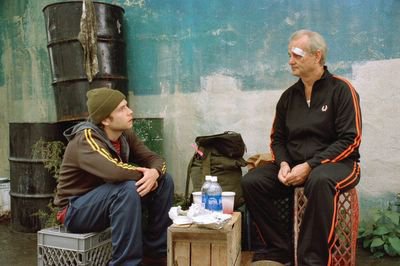
Broken Flowers.
An unexpected and long overdue late masterpiece from Jim Jarmusch.
The film has a shaky, mannered start, (like most of Jarmusch's good films) but becomes more relaxed and involving as it moves along. The most welcome surprise is the beautifully understated directing style, completely devoid of the usual winking irreverancies that have kept Jarmusch's talents as a director restricted to the "cult classic" section until now. That he has managed to make his most coherent, and simultaneously befuddling , film to date all in one go is impressive.
On first viewing I admired two things about the film above all else:
1. The film is about a road trip, and in movieland we all know what that means. Endless shots of beautiful, semi-deserted highways through which our protaganist will drive while cool music plays on his stereo. Jarmusch keeps the music, but ditches the scenic highways. What he replaces them with is real roads and the real traffic that flows along them. This subtle difference doesn't really call attention to itself for the most part, but it's there and it's crucial. You will probably first notice it as a strange, dissatisfied feeling that begins to gnaw at you during the driving scenes, as if the cuts are coming in the wrong places. Semi trucks especially seem to invade the frame in an uncomfortable and disorientating way, or more to the point, in a way that is recognizable as being very similiar to how driving on today's roads actually feels. The unexpected novelty of this is compounded by the enevitable follow up realization: Why had I never noticed the obvious "clearing of the road" artifice in road trip movies until now? Look closer and you will see that the entire film is suffused with this kind of seeing, what Baudelaire called "the painting of modern life," or to put it less eloquently-an acknowledgment of the current face of the world, and a search for beauty and meaning within that world, rather than a denial of it's presence. From the downloaded "Mapquest" papers that Bill Murray grudgingly totes around, to the cookie-cutter townhouses that he nervously visits, the elements of this film are bits and pieces of the world as it currently stands.
2. Somehow, all of the characters in this film (and there are quite a few) steadfastly refuse to fit into the stereotyped boxes that we unconsciously prepare for them when they first appear on screen. They remain highly individualized, unique human beings, despite their obvious eccentricities, until the very end. As more and more characters appear over the course of the film, the ability of Jarmusch to sustain this kind of ambiguity becomes all the more admirable.
The knowing "Jarmusch" wink, that smirking post-modern shrug that says "This may all mean something, but I'm not telling." is absent from "Broken Flowers." In it's place is something I found much more rewarding. A compassionate questioning of contemporary life, a life that Jarmusch, for once, finds interesting and compelling enough to present with a straight face.
<< Home